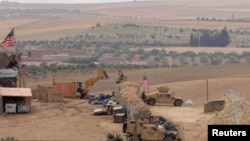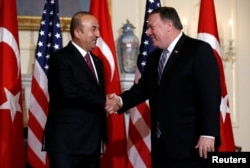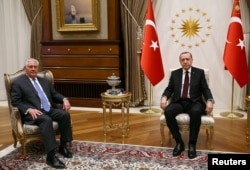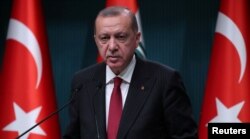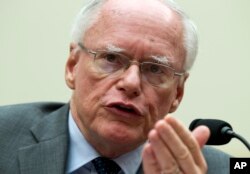Turkish-U.S. cooperation continues to deepen in Syria, despite a crisis in bilateral relations. According to the Turkish military, the two NATO allies are about to carry out joint military patrols in northern Syria's Manbij region.
“Though there are a few days of delay in the schedule, the process continues without a hitch. We are now entering a joint patrol period,” Turkish foreign minister Mevlut Cavusoglu said to reporters Sunday.
Manbij has been a point of tension in U.S.-Turkish relations since Syrian Democratic Forces (SDF) captured the city from Islamic State. A large part of the SDF is made up of the Syrian Kurdish militia, the YPG, considered by Ankara as terrorists linked to the PKK. Washington and the European Union designate the PKK as a terrorist organization.
Washington’s military backing of the YPG in its war against IS has been an underlying cause of rising tensions with Ankara.
“When Turkey identifies the YPG, which is obviously linked to the PKK, as not just a major security threat but as a fatal threat, and the Pentagon behave as if they couldn’t care less, obviously makes it difficult to have a common ground or dialogue,” said international relations expert Soli Ozel of Istanbul's Kadir Has University.
Ankara accuses Washington of reneging on a deal that would have guaranteed the withdrawal of the YPG militia from Manbij after its capture in 2016.
Then-U.S.. Secretary of State Rex Tillerson, in a meeting February in Ankara, hatched a strategy to compartmentalize the differences between the countries. The process included resolving the controversy over Manbij, in which the joint U.S.-Turkish military patrols, along with the withdrawal of YPG forces, were part of agreed efforts to defuse tensions.
The deepening cooperation in Syria comes as bilateral ties are facing one of their worst crisis. This month, the Turkish currency collapsed after U.S. sanctions and tariffs in retaliation for the ongoing detention of American pastor Andrew Brunson. Turkish President Recep Tayyip Erdogan accused Washington of waging “economic war.”
“A Manbij agreement, however nebulous, is symbolically very important for those in power in Turkey,” Ozel said. “I think neither side has an interest in totally breaking relations.”
Ankara is now looking to Washington fulfill another part of the Manbij agreement.
“We expect (the YPG) to withdraw completely to the east of the Euphrates,” Turkish presidential spokesman Ibrahim Kalin said at a news conference Monday in Ankara.
Analysts claim Ankara sees control of Manbij as a strategic objective at a crucial junction in northern Syria. Turkish forces already control a broad swathe of territory in northern Syria.
Ankara also reportedly views as a priority securing potential lucrative reconstruction contracts, including the rebuilding of Manbij. Such contracts, economists say, could be vital to boosting the Turkish economy, which is facing recession.
But U.S.-Turkish tensions are predicted to escalate, with Washington warning of new sanctions against Ankara.
“An attack on our economy is no different from a direct strike against our flag and call to prayer,” Erdogan said in his Eid al-Adha message on Monday. “The purpose is not different. It aims to bring Turkey and the Turkish people to their knees,” he added.
Around 2,000 U.S. special forces are deployed in Syria with the YPG Kurdish militia, just across Turkey's southern border. On Sunday, Erdogan reiterated his threat against the militia.
“We will eliminate the terrorist threat coming from the territory of Syria and Iraq. We will not let terrorists control zones near our southern borders,” he said at the Justice and Development Party’s Congress.”
“The United States of America needs Turkey for its further Middle East policies, if America really wants to stay there,” international relations professor Huseyin Bagci of Ankara’s Middle East Technical University, said.
Analysts see Washington’s appointment of a former ambassador to Turkey, James Jeffrey, as special representative to Syria as a boost to bilateral cooperation. Ankara sees Jeffrey as one of the most sympathetic American diplomats to Turkey.
Observers say Ankara, too, has an interest in maintaining cooperation with Washington in Syria, given that differences with Moscow are emerging. Russian-Turkish ties have deepened over their efforts, along with Tehran, to resolve the Syrian civil war. However, Ankara strongly opposes the Damascus regime’s planned offensive, with Moscow’s support, against the Idlib rebel enclave.
Analysts warn given the increasingly toxic U.S.-Turkish relationship and its unpredictability, the potential fallout could be cooperation in Syria. “It’s such an accident-prone relationship now. You may end up in a place you don’t intend to,” Ozel said.
